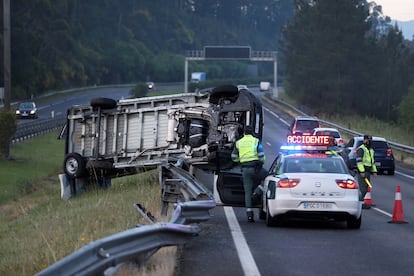Spain has reduced road deaths by 80% over the last 30 years
The low number of victims in traffic accidents now puts the country fourth on the list of European Union countries with the best figures

Over the last 30 years, Spain has managed to bring down road deaths by 80%, with fatalities falling from 9,344 in 1989 to 1,755 in 2019. This is one of the conclusions to be found in the book Del infinito al cero. Así lo hicimos (or, From infinity to zero. This is how we did it), and which was presented last week by the Fundación MAPFRE, a foundation belonging to the Spanish insurer of the same name.
The book also points to the fact that in 2020, Spain became the fourth European Union country with the lowest death rate caused by this kind of accident, only behind Sweden, Malta and Denmark.
The autonomous regions of Spain that have seen the biggest falls in the last three decades are Asturias (88%), Castilla La Mancha and Castilla y León (87%), Cantabria (84%), Basque Country (83%) and Galicia (82%).
The book also explains that to reduce the number of victims even further, there must be more focus on vulnerable users
The more than 50 experts who have worked on the book – among whom are general directors of the DGT traffic department, European experts, researchers and representatives of victims’ associations – all agree that this improvement in the statistics is thanks to major efforts made in different areas. Among these are the points system introduced for driving licenses in 2005, the improvement in the country’s road network, the technology of vehicles and improvements in education, among others.
Speaking during the presentation of the book, Interior Minister Fernando Grande-Marlaska pointed to the successful Spanish policies being down to “a greater general awareness,” which has led to a view of road deaths being “intolerable.” What’s more, he cited the strong points in Spain in this respect. “The strength of our road safety policy is based on four fundamental pillars: education in values and continuous training of drivers; a precise and necessary set of rules; the insurance system, based on accepting human error; and the victims’ associations, who are our best guide and to whom we have given a voice.”
The book also points to the challenges for the future and the work that is left to do. In particular, it explains how Spain will have to “revitalize” its safety policies in coming years to fight against what it describes as the “exhaustion” of certain measures. It also explains that to reduce the number of victims even further, there must be more focus on vulnerable users, such as pedestrians, cyclists, motorcyclists and the users of scooters. In 2001, these groups represented 32% of road deaths, but by 2019, that figure had risen to 53% of the total.
English version by Simon Hunter.
Tu suscripción se está usando en otro dispositivo
¿Quieres añadir otro usuario a tu suscripción?
Si continúas leyendo en este dispositivo, no se podrá leer en el otro.
FlechaTu suscripción se está usando en otro dispositivo y solo puedes acceder a EL PAÍS desde un dispositivo a la vez.
Si quieres compartir tu cuenta, cambia tu suscripción a la modalidad Premium, así podrás añadir otro usuario. Cada uno accederá con su propia cuenta de email, lo que os permitirá personalizar vuestra experiencia en EL PAÍS.
¿Tienes una suscripción de empresa? Accede aquí para contratar más cuentas.
En el caso de no saber quién está usando tu cuenta, te recomendamos cambiar tu contraseña aquí.
Si decides continuar compartiendo tu cuenta, este mensaje se mostrará en tu dispositivo y en el de la otra persona que está usando tu cuenta de forma indefinida, afectando a tu experiencia de lectura. Puedes consultar aquí los términos y condiciones de la suscripción digital.








































